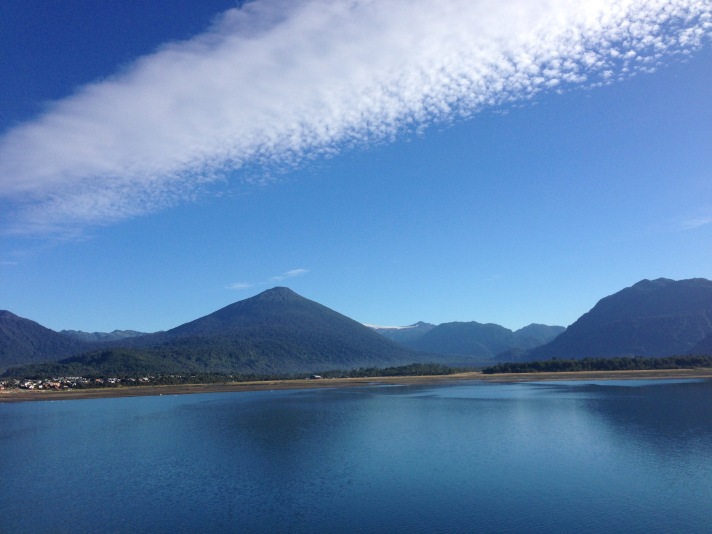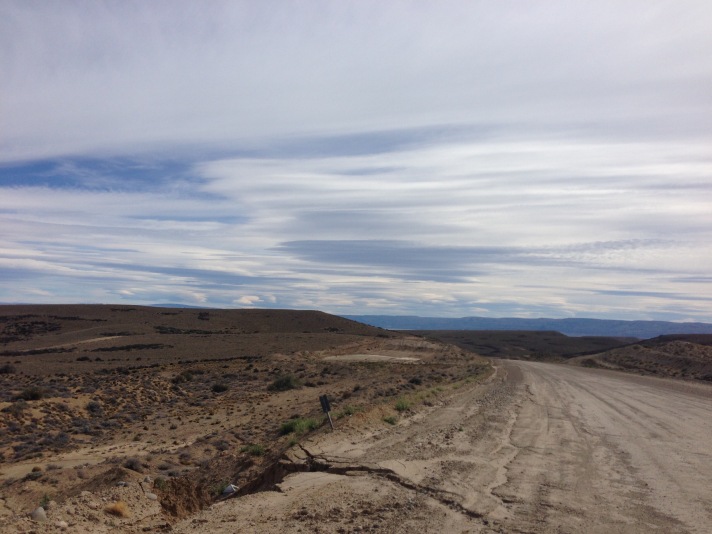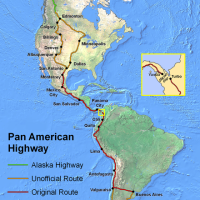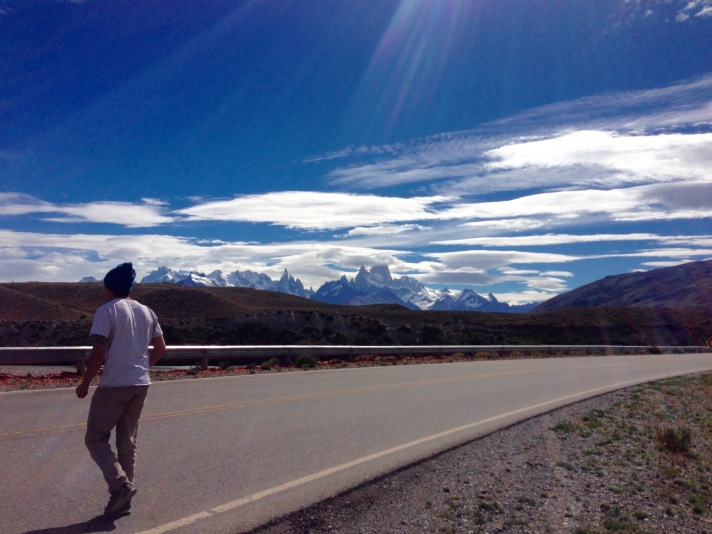
The Carretera austral began in the rusty port town Puerto montt, the gateway into Chilean Patagonia. The 1250 kilometre road was finally finished in 2000, a vanity project of Pinochet it was to link northern and southern Chile, uniting the two parts, handing Pinochet stronger territorial control. Passing through the most unlikely parts of the country, complete with fjords, glaciers, untold waterways on mostly gravel road to serve a mere 100,000 people in an area the size of Ireland. It was also going to be a return to consistent wild camping and unspoilt landscapes that I hadn’t seen in consistency since British Colombia. Puerto montt had a rickety, if slightly dodgy charm and I stocked up on supplies and found a nice ladies yard to camp in. A good ten kilos of oats, pasta, coffee, lentils, tuna, pate and a plentiful supply of cookies left me with bulging panniers and I rode towards the first fjord crossing ferry. I had been warned of nothing but rain but was treated to perfect mid 20s and a cool breeze. The houses were more spaced out across the bay, locals selling their fresh catch and I saw sea lions playing in the wake below. The tarmac quickly turned to what the Chileans call ripio, interspersed with river pebbles which sent shudders through my whole body and occasionally knocked me off course. Passing cars filled the air with a thick dust which took no time to turn me a dirty brown. I found a refugio to camp and headed out early for the next ferry which would put me on the long route south.

Waiting for the cars to leave the ferry I came across the young Chilean Felipe and his wildly stacked mountain bike. We chatted for a while before the dock was left empty and set off together up the uneven surface on another wonderful day. We partnered up and found a matching pace for a wonderful week ahead. Despite a day of downpour we had nothing but sun and cool breezes to welcome up and we made the 600k towards cohaique, the only town of notable size in a week, whilst most cyclist would struggle along in two. The road didn’t disappoint as an abundance of perfectly clear rivers made for perfect camps. The road was lined with huge blackberries and havians, a type of nut which made for great addition to morning porridge. The longer evenings meant we could have a nice few hours of bathing in the rivers, fishing and cooking to while away the evening. Trout were plentiful and made a wonderful change from tinned tuna. The remoteness and ease of camping life really brought me back to life in Alaska and northern Canada. The tiny pueblitos, every 100k or so we’re perfect places to have a chat, find some supplies, wander for an hour or so and move back in to the wild.

The scenery was completely unspoilt and different glaciers hung high above steep mountains feeding spectacular glacial rivers, they marked each descent into the next valley. The small towns were fascinating and I spoke to a few locals about their history and industry. It seemed most survived on sparse mines or on wood trade but there was little or no industrial feel. The distinct wooden houses seemed quaint and village like, not as you would expect from parts in such wild weather and remoteness. Though most bared the scars of a yearly winter battering. Me and Felipe developed a great Rhythm and I taught him English and he helped with my Spanish, we joked over our evening camp fires. I sped off on the Tarmac sections of the road and he overtook as the Tarmac turned to dirt again.

The road forked just short of Coyahique. Felipe took the dirt track and we raced the 75 kilometre distance, I had an all smooth paved road, which wound towards and away from the prevailing winds. He had 7 kilometres less, avoided a lung busting 7km climb but had to do it all on ripio. I flew into town just three hours later and immediately scouted wifi to be the first to send the arrival what’s app message. I took a quick swing around the plaza and then look to found a bed as the rain started to fall. An old university building offered me a spot to sleep on the floor as there were no beds left and I settled in by cooking up some steak and wine, satisfied under the consistent potter patter of rain on the tin roof. The rain persisted in the morning and I decided on a day off. I shopped and stocked up, watched a film and chatted with an older Californian Chris who had just walked all the way up from Ushuaia in three months, I was hoping to make it in three weeks. He carried his belongings in a baby buggy. His previous sailing trip had ended of the coast of Togo as his ageing boat sank, he lived in the church there for six months before heading to start walking his way up. He was thinking of swapping the buggy for a bike and I spent the best part of the day and breakfast persuading him it was the right thing to do. I hooked him up with all the people in the biking community that I knew would help him get going and left the next day with his plans to travel up to Santiago to get kitted up and start his next adventure on two motorless wheels.

The weather made a dramatic turn and the temperature dropped drastically as I climbed out of Coyhaique, as much as I had loved the austral I opted to take advantage of the dip in the Andees to get back to the Argentinian side. I didn’t fancy ripio in the rain and the ferry to cross the border at the bottom of the austral was Patagonian rich tourist prices silly expensive. I knew I could take a boat across Chiles largest lake the the border town of Chile Chico, though I had no idea when the boats left. In the part of Patagonia many boats were booked up but I took the risk and headed towards Puerto Ingeniero Ibanez. High above the port 8 kilometres out of town I saw the ferry pulling in and raced down to meet it. I was in luck and the small rusted Pilchero had space on a departure within the hour. I rolled the bike onto the 6 car deck, brewed up some coffee as the noisy engines pulled us towards Argentina. Taking in the sunset cutting lines through cold and foggy evening, lighting up the pastel colours of Cerro pyramid I felt a strange Patagonian melancholy. I’d worked out that roughly 2000 kilometres separated me from Ushuaia and a wave of emotion rushed over me as I watched the wake split the white water. A melancholy definitely suited to these parts of the world where there are barley roads, solitary singular wood shacks every 50 kilometres, ever changing, hostile weather and the wondrous sense of vulnerability and diminished importance of the human individual. A melancholy at the same time daunting and comforting. My mind jumped back to the ferry I took down the inside passage in Canada where I saw humpbacks and killer whales and chatted to a typically bc alternative pyro artist on a sun filled evening 17 months previous.

The geography of the Patagonian waterways having a likeness to that of the north west British Colombia, my thoughts of the imaginary mirror highlighting the geographical symmetry of the Americas. Except back then my journey was beginning and I was heading into the continent, into the heat and culture and population and all the dynamism that came with it. I felt acutely aware that now I was heading out of the continent. Towards the barren shores of tierra deal fuego, towards my goal but also towards the end of an experience I new it would be hard to have again. A child grabbed my jogging bottoms and he played on deck and I snapped out of my melancholy. I made my way to the stairwell near the engine room to make use of the ageing vessels heat source and fell quickly to sleep. I met Former truck driver turned bike tourer Kanete and we teamed up. Crossing back into Argentina was a doddle and the Pampa stretched on for miles. I joked around with the customs officer searching my bag and felt good to back with the cheeky humoured Argentinians. Guachito San gils roadside memorials re-appeared and made me feel a little more accompanied on the roads. This was one of my favourite Argentinian customs and I left him a cookie and lit a candle as the lone car that passed by hooted his respects and waved to me. These shrines were abundant on route 40, complete with a grill, pick nick table, a memorial statue and flags adorning various messages of respect and encouragement. Bottles of wine, beers, sweets and cigarettes surrounded his shrine as humble offerings.

Perito moreno was the beat up border town sitting lonely on the Pampa. It’s infrastructure was quite cute but it’s smashed up bank and desperate looking tourist information office capped of with a high street containing a bunch of shops yet only lights on in the local supermarket marked its desolation. Me and Kante found a kitchenette to cook in and shares wine and our where culinary concoctions in jubilant mood. I liked riding with Kante but needed to make distance so upped the pace. Riding on the Pampa reminded me of my first job in Leeds with my two band mates at the time. A data entry job involving pressing a combination of space bar shift or enter for eight hours a day with a couple of ten minute toilet break. I survived that for two weeks so I was confident of my chances here and made an early start. I caught the pampas south westerly and settled comfortably into Dan Carlins six hour podcast on the Cold War. Six hours later I had managed only half of the distance I thought I would make and I was leaning at 45 degrees to counter the relentless side wind. Every 2 hours I took cover in a drainage ditch under the road and by 7pm figured I would be spending my night in the next one. On the Pampa there were no trees or no features to take cover behind and there was no way my tent could handle the wind. Unfortunately these drainage tunnels also doubled up as toilets for drivers making the long slog up the 40 as the only places you wouldn’t be seen for miles, my map said my route would swing a good 30 degrees to my left soon enough so I pushed on and on and on and eventually caught a tail wind which helped me to baja caracoles an hour after nightfall. The outpost had a bar, hotel and an airport and that was it. The guys in the bar didn’t take kindly to my asking if I could pitch up behind the wall, I knocked on a door and the old man wanted to charge me twenty dollar to camp on his drive. Feeling a little hopeless I pushed my bike around the 2 dirt streets lacking the energy to think up a plan when Juan Carlos saw me from health centre and rushed out to meet me. He had a small shed, complete with bed and gas stove which he said was mine for the night. He opened up and prepared some mate as he told me of his new life as a doctor in what appeared to be a skeleton of a community. He had an ethuaiasm which seemed completely uncharacteristic of the place and I was warmed by his attitude and mate. The next night I had to resign my luck and sleep in a drainage tunnel. The truck drivers shit at one end. Me at the other, still it was warm enough, out of the wind and out of the rain. The next night I found a construction shed used by the gritters in the winter to escape the wind and managed to sleep through the thunderous echo of its thin sheet metal walls flapping and flailing in the wind. As bleak as it sounds I actually enjoyed the Pampa for its raw and wild beauty.

I cruised into first town in three days, governor gregores, with its windswept high street and population of 600. A relative metropolis in these parts, after flying in on the wind. with hours and hours to spare, and the Argentinian 2 pm siesta set in I was thinking I might treat myself to a room. As ugly and Barron as this part of Argentinian Patagonia was it was tailored for the wealthy adventurer type, complete with expensive Columbia jackets. Rented camper vans and motor bike tourists checked into humble yet over priced rooms and I couldn’t find anything near my budget. Even the municipal camping would set me back over twenty bucks so I asked at the gas station if I could camp behind its wall out of the wind. They offered me the shower and I could make use of the wifi. I sat on my groundsheet and cooked up some mince, potatoes and carrots with cheap redwine, two grubby, once white laboradores sat by my side with pitiful faces so I shared my bread. The fancy passers by stared a little whilst purchasing overpriced snacks and continuing there way on their vacations with pondering faces, most probably wondering why. Strangely in that moment I felt completely content and looked back with an arrogant sense of confidence, a smugness. It took me back to a statement my friend Emily made when I was living this kind of way in Canada. She said without a beer and a bed at the end of the day it doesn’t sound like much fun. And that it wasn’t. But I recalled why I dreamed of travelling in this way and it wasn’t for the fun. It was to experience a different way of living, to live without the comforts or security that me and my demographic are so used to and one I think is somewhat illusionary.To escape the false sense of security so often afforded to a life I had previously lived and would probably go back to. In that moment in the in the corner of the dusty gas station car park, eating with the dogs I felt so much more alive. With the simple goal of getting through the pampa in one piece. Food, shelter, warmth and water were the main sources of accomplishment along with putting kilometres on the clock. Receiving moments of kindness and warmth from strangers, watching the birds of prey ride in the torments of the winds, small clever solutions to minor technical problems, tactical games with the wind and relaxing with the orange glow of the low sun. Fun was the goal of most people’s vacations but I knew that this trip for me wasn’t a vacation purely to enjoy, it was to be an experience where I would test myself and my adaptability, experience what came, not necessarily what I wanted. The thing about riding a bicycle is you can’t miss anything, even the parts you want to miss. This just isn’t an option so a journey through a week of ugly nothingness is something you have to do. And often once you do it you realise it isn’t ugly nothingness but a chance to explore other things other than pure enjoyment. What people described as a boring part of the route to miss I felt was an essential part to experience. Rather like a French film. Very little action and in your face stimulus but a chance to subtly be drawn in to a mood and have the time to reflect and look at the little things, or the big things. Depending on your approach. A slightly cheap wine drunk head looked forward to the dirt road from hell riding into the wind tommorow purely because it was there, aware that this approach couldn’t last for ever but I was glad I had it in my armoury.

I got an early start into the wind the next day. I could see on the map with the right angle in the road it would be a day of two extremely apposing halfs. Riding with the Patagonian wind at my back was a surreal experience. It’s the closest I’ve felt to flying. The wind picking me up and gliding along without a sound. Completely peaceful with only the whistle of my tires on the road I took in the vast expanse of nothingness of the Pampa. The heat shimmering as it rose of the horizon the only sign of movement. I frequently passed alpaca, though they have another name here which escapes me, would leap over the fences and make off for the distance and the odd emu would be found wandering the road. Carcasses of cows, armadillos and sheep lined the rubble which raised the road. Turning into the wind the noise was horrendous. Reverting to a sideways slant, the same as the fences it appeared the whole world had been tipped on its side to make way for the torment of the ferocious wind. It was a strange experience as with out trees or features it was hard to see any real evidence of the wind until I passed road signs which would shake ferociously. This gave the impression that the only two things of movement were me and the wind itself. Creating a feeling of a very personal battle. I completed 176 kilometers on a day which had 70 kilometres of ripio and feel pretty pleased with myself. Waiting at the junction to the hikers paradise El Chalten I didn’t fancy the 90 kilometres ride off route directly west into the wind but also didn’t want to miss out on the chance of seeing the famous jagged peaks of its mountain, Chalten, though commonly known as Fitz Roy. Martin picked me up with three young Argentinian hitchhiking ladies and we sped of on the pampa west toward the mountains. The range made itself apparent a full 80 kilometres away and was an other worldly sight. We stared at the quickly approaching sight as one of the young girls in the back started crying she was so moved by the sight. We stopped multiple times to walk around and take it in as the wind blew into our faces. Once again I was grateful to my good luck and to Martin, it would have been a sight to miss for sure.


Hi Robert. I shall miss your blog when you finally reach your destination. Sue was talking to your mum yesterday and she said she and Ginny are going down to Buenos Aires to meet you there. I am afraid that in the time you have been away this country has got worse for the poor almost everyday, not a happy place to come back to. Regards. Ted Haslam.
LikeLike
0 Pingbacks